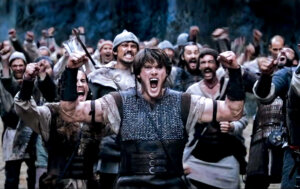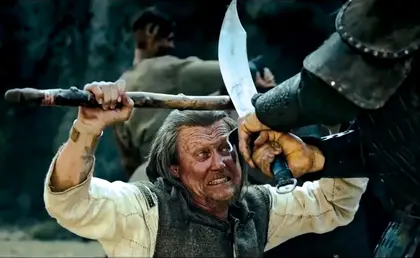It’s hard to imagine a Ukrainian that doesn’t know who Zakhar Berkut is.
A central character in the novel of the same name by one of Ukraine’s best writers, Ivan Franko, Berkut is a legendary symbol of a relentless fight for freedom.
JOIN US ON TELEGRAM
Follow our coverage of the war on the @Kyivpost_official.
The novel has been a part of the literature program at schools for years, appearing to be a favorite story among kids.
Franko’s historic novel was first adapted for the screen in 1971. The story has been brought back to the cinemas under the name “The Rising Hawk” in its English version and “Zakhar Berkut” in Ukrainian.
And it appears to be the country’s best action drama so far, maintaining the tone of the original story yet adding a new scale of epic battles.
“Freedom is my nature,” the movie’s slogan says.
The film is a co-production of Ukraine and the United States. Its directorial seats were occupied by representatives from both countries: Crimean Tatar actor and filmmaker Akhtem Seitablaiev and U.S. filmmaker John Wynn.
The movie was shot in English, and most of its leading roles were played by U.S. actors.
“The Rising Hawk” turned out to be one of the most expensive films ever shot in Ukraine. Its budget was Hr 113.5 million ($4.5 million), almost a third of which was provided by the country’s State Film Agency.
The film had its Ukrainian premiere on Oct. 10 and is in theaters now. It will be distributed in Spain and is working on expanding the list of countries with its screenings.
Historical basis
The picture is set in 1241 in the Carpathian Mountains, then part of the Kingdom of Galicia–Volhynia and today located in western Ukraine.
It immerses the audience in the world of 13th century Ukraine through the life of a small village headed by Berkut. Their people make a living by hunting and picking berries and provide for all of their needs by mastering various crafts, from blacksmithing weapons to tanning leather for armor and making jewelry. A big part of their lifestyle is polytheism, the worship of multiple Slavic gods and goddesses, which sometimes means grand celebrations and rituals.
The peaceful life of the village’s community, however, is soon shaken by the Mongol Empire, which had invaded and conquered most of Kyivan Rus by that time. As the Mongol army approaches the Carpathians, it attacks one of the villages, ferociously killing most of their citizens and holding others hostages. Berkut’s sons, Maksym and Ivan, sneak into the invaders’ settlement and release the people, provoking the Mongolian khan’s wrath. The brothers proceed to lead the fight for their people’s lives alongside their dad.
Although the film and the original novel, are based on historical events, its storyline is not an exact reflection of reality – most of the film’s characters, as well as the whole plot, are fictional.
The people of the Kingdom of Galicia–Volhynia indeed courageously protected their lands, fighting one of the strongest armies in history on its way to new conquests in Hungary and further in Europe.
“We were born here. These mountains made us who we are,” the film’s narrator says.
Before the Mongol Empire became the largest contiguous land empire in history, occupying most of the continent, it, in fact, had hard times in western Ukraine: some of its fortified cities managed to repel the attackers, while some villages succeeded in escaping before the Mongols reached them.

Action must-haves
Since Ukraine started allocating state funds for making movies through the State Film Agency, a number of action pictures have been shot here.
However, rarely if not ever do they reach critical acclaim, and they often lack essential elements for a good action picture.
But “The Rising Hawk” appears to be an exception.
Any good action film starts with a world – either created or set up in detail to give the audience a sense of the reality that the characters live in.
The movie’s team did that perfectly, recreating the 13th century village through both the plot, which depicts the community’s ordinary life, the people-led form of government, the legends they believe in and their values, as well as through production and costume design, with authentic-looking weapons, various equipment, buildings and clothes.
Surprisingly, the two-country collaboration turned out to be a key to a successful depiction of the local color. The Ukrainian side provided knowledge about the area’s culture and set up a Carpathian village with precision, while the U.S. part of the team contributed to making the story universal, cutting out the unnecessary details.
No matter how well-thought out the movie’s world is, however, a good action movie is impossible without a charismatic, motivated and relatable protagonist.
Although the central figure in the story is Berkut (U.S. Robert Patrick), it’s actually his younger son, Maksym (U.S. Alex MacNicoll), who takes the leading role in standing up to the Mongols.
Moved by the desire to protect his community, he proves to be a smart and fearless battler who is ready for sacrifice.
“Choose to run away and save yourselves or become one, protect our home and fight for what is precious to us,” Maksym says in one of his goosebump-inducing speeches before a battle.
But why need a protagonist if there is nobody to combat? A first-class action film requires some horrendous villains.
Ukraine’s history is full of those, from the Russian Empire’s soldiers to the Soviet Union’s comrades, but there was nobody as mysterious in its ruthlessness as the Mongols.
“Demons on horses,” one of the film’s characters describes them.
Dressed in black armor, their vast army resembles a dark cloud covering any area they invade, promising no sunshine to the people it conquers.
The world-protagonist-villain mix wouldn’t be complete without the most essential part of an action picture, some badass fights, which “The Rising Hawk” makes sure to deliver.
All the film’s battles, from the one on one bet battles to the film’s biggest combats in forests and in between steep rocks, are breathtaking and thoughtfully choreographed scenes – part of the reason it has been compared to the legendary action picture about Spartans “300” starring Scottish actor Gerard Butler.
Values
“The Rising Hawk” has some minor plot holes and several dialogues that sag a bit. Nevertheless, that doesn’t hurt the overall anticipation that the film builds. The picture gradually adds layers to the plot leading to its main, final battle.
The film has been criticized for some of its casting choices, one of which was Irish actress Alison Doody, who plays Berkut’s wife Rada. The 52-year-old appears to have a very unnatural look because of some personal dabbling in plastic surgery. To put it mildly, Doody looked out of place in the period film set in the 13th century.
Most of the film’s cast, however, bring some A-game acting. Patrick, known for the villain role in “Terminator 2: Judgment Day,” portrays a restrained and wise leader. Ukrainian actor Andriy Isaenko masters the role of a mute yet expressive and heroic fighter Petro. And British actor Oliver Trevena delivers one of the film’s best performances as the elusive daredevil Bohun, a symbol of the Ukrainian fighter spirit.
All of that has been masterfully stitched together with some astonishing cinematography by Ukrainian Yuriy Korol.
The movie’s shots brilliantly picture the beauty of the Carpathians, often mysterious and shrouded in fog, as well as the thrilling aesthetics of numerous bloody fight scenes framed by burning buildings and trees in the background.
Although it’s a universal story, the film is a special one for Ukraine. It actually might be one of the first movies to make Ukrainians feel proud of their history and artistic heritage. Not only does it bring back a monumental moment of the country’s past but it also translates some of its key values that Ukraine has fought hard to carry through the years.
“We have won by our public order our unity and our friendship,” the narrator says, sending the audience a taste of Franko.
You can also highlight the text and press Ctrl + Enter




